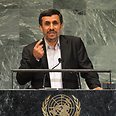
Iran 'confidence' bid shifts uranium to fuel stock
UN experts say Islamic Republic converting a third of its most highly enriched uranium into powder for medical research reactor in hopes of restarting nuke talks with West
In a bid to ease international concerns over its nuclear program, Iran has converted more than a third of Tehran's most highly enriched uranium into a powder for a medical research reactor that is difficult to reprocess for weapons production, experts and UN monitors say.
- UN chief says sanctions on Iran affecting its people
- Downed drone: Iran testing Israel's capabilities
- Report: Israel's Iran policy shifting amid Tehran unrest
The work — noted in a technical report by the UN's nuclear watchdog agency in late August — suggests Iran is trying to display enough goodwill to restart nuclear talks with world powers, while aiming to soften demands by the US and others to halt Tehran's top-level uranium enrichment.
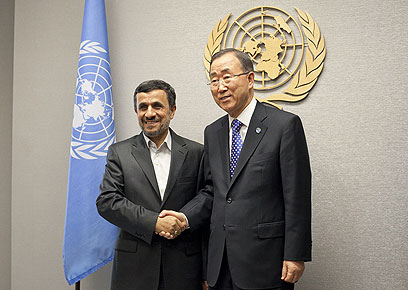
UN chief Ban Ki-moon with Iranian President Ahmadinejad (Photo: AFP)
An influential Iranian parliament member, Hossein Naqavi, said the country was taking a "serious and concrete confidence-building measure" by converting some of the 20 percent enriched stockpile into U3O8, or uranium oxide, in the form of powder.
The move also appears to be part of a wider strategy to seek relief from tightening Western sanctions in exchange for step-by-step plans to scale back uranium enrichment, which Washington and its allies fear could lead to weapons-grade material. Iran insists it only has peaceful nuclear ambitions.
But it has offered no substantial concessions to cut into Iran's stockpile of 20% enriched uranium, the highest level acknowledged by the Islamic Republic. Iran already has enough to provide fuel for its Tehran research reactor for years and labs are equipped to make more material at that level, said Olli Heinonen, former director-general at the UN's International Atomic Energy Agency who headed the organization's Iran file until 2010.
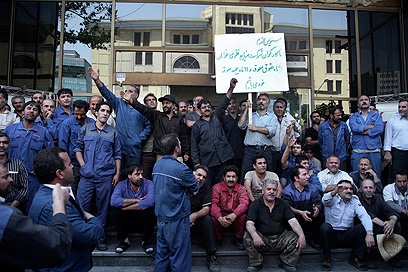
Iranians protest due to Western sanctions. (Photo: AP)
So far, Iran's proposals have met with resistance from the West as the economic toll from the embargos take a toll, including protests this week after the nation's currency shed nearly 40 percent of its value.
Iran's 20% enrichment program is among the core disputes. That's because it can be boosted to weapons-grade far more rapidly than the 3.5% enriched uranium used for Iran's lone energy reactor.
Iran says it needs this degree of enrichment for its medical research reactor, which can produce isotopes for cancer treatment. It also has announced plans to build more such reactors. The US and allies want Iran to halt the 20% production and ship the rest of the material outside the country.
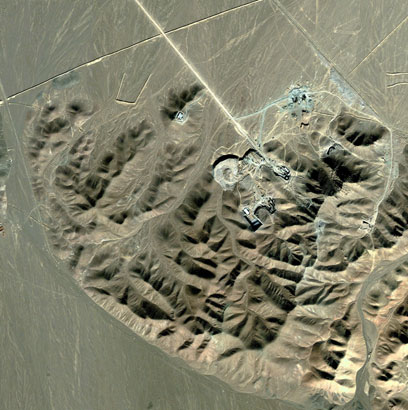 .
.
Iranian nuclear facility in Fordo (Photo: EPA)
The impasse has put talks on hold between Iran and a six-nation group, the permanent Security Council members plus Germany.
Iranian officials repeatedly insist they will never give up the capacity uranium enrichment. But tightening Western sanctions and growing public outcry could open Tehran's leadership to more deal-making.
The UN's IAEA confirmed in its Aug. 30 report Iran had made U308 — uranium oxide — from 71.25 kilograms (157 pounds) of its total of 190 kilograms (nearly 419 pounds) of 20% enriched uranium produced until mid-August.
U308 is effectively off the table as a material for possible weapons production, experts say.
The powder is turned into fuel plates for the reactor, but it is complicated and dangerous to try to change the radioactive powder back into a gas state needed for the enrichment centrifuges, said an Iranian nuclear scientist, Rasoul Sediqi Bonabi, a professor at Sharif University of Technology in Tehran.
And, more importantly, Iran doesn't possess the technology even to make an attempt, he added.
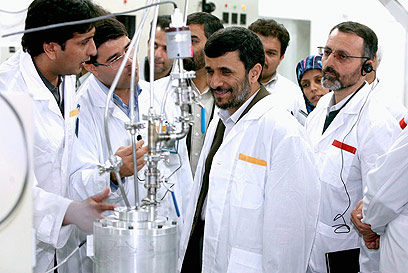
Ahmadinejad in Natanz.(Photo: EPA)
"Once converted into U3O8, it's not usable for producing bomb grade uranium and of little proliferation concern," Bonabi told The Associated Press.
Iran insists it does not seek atomic weapons and is only using nuclear technology for energy production and medical applications.
Naqavi, spokesman of the parliament's security committee, said the move is expected to facilitate talks between Iran and the world powers and pave the way for a diplomatic solution over Tehran's nuclear activities.
"Iran has demonstrated" its rejection of nuclear arms, said the lawmaker Naqavi, spokesman of the parliament's security committee.
But the former IAEA official, Heinonen, estimated Iran is still producing about 15 kilograms (33 pounds) of 20 percent enriched uranium a month. That could rise to 20 kilograms (44 pounds) a month if Iran expands work at an enrichment facility in Fordo, which is dug deep into a mountainside south of Tehran.
Some experts say Iran would need 200 to 250 kilograms of 20% uranium to turn into one nuclear warhead. Others say anything above 170 kilograms is enough.
Mark Fitzpatrick, director of the Nonproliferation and Disarmament Program at the International Institute for Strategic Studies, said Iran's decision to produce U308 is "slightly reassuring."
"It tends to confirm that there is a civilian purpose in enriching to this level," he said in an emailed statement.
But Fitzpatrick and another American nuclear scientist disputed Bonabi's assertion that Iran doesn't have the technology to reconvert the material.
Iranian engineers have the know-how to convert the U308 powder back to gas for the enrichment centrifuges, Fitzpatrick said.
"It would not take long to set it up," he said, noting the procedure is similar to the existing conversion line of uranium ore concentrate — known as yellowcake — to a gas known as UF6 that is the feedstock for enrichment.
Matthew Bunn, an associate professor at Harvard's John F. Kennedy School of Government, also said Iran has the ability to reconvert the oxide into uranium gas.
"It is possible ... Iran has the technology," he said.
Heinonen noted, however, that any debate about Iran's conversion to the U308 powder "might not really be an issue" since it already has a critical mass of 20% enriched uranium.
"And the stocks are likely growing," he said.
- Follow Ynetnews on Facebook and Twitter
- Receive Ynetnews updates directly to your desktop










